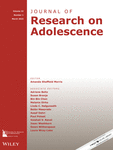Adolescents in the 21st century are growing up in a world marked by dramatic changes in their social, political, economic, physical, and technological environments. These changes present both challenges and opportunities for adolescents, with varying impacts on adolescents depending on culture, geographic location, race/ethnicity, and gender, among other factors. This special issue centers interdisciplinary approaches to research on adolescence, with an emphasis on advancing knowledge and informing translation of research and implementation of programs, practices, and policies to address problems facing today’s youth and facilitate progress towards “realizing opportunity for all youth” (National Academies of Sciences, Engineering and Medicine, 2019). Interdisciplinary scholarship, which intrinsically integrates two or more disciplines in conceptual and methodological approaches, has great potential to advance the understanding or application of research to solve complex challenges facing today’s youth in innovative ways that are otherwise difficult to address in the context of a siloed, single discipline. This approach also has potential to address the gap that has historically existed between basic science on adolescent development and the preventive intervention and policy efforts to improve the lives of adolescents. The proposed special issue, Advancing Studies of Adolescent Development from Bench Science to Preventive Interventions and Policy Through Interdisciplinary Research, launches a call for papers that pose questions about contemporary issues confronting adolescents using an interdisciplinary lens, including but not limited to: neurobiological and epigenetic levels, individual, family, and interpersonal levels, economic and political levels, and broader dissemination and implementation considerations. Examples of priority areas of interest that bridge bench science and social policy are papers addressing biological mechanisms of social environment risk that exacerbate health disparities; impacts of economic, health, or social policy changes on adolescent physical and mental health; or preventive interventions that target multiple domains of adolescent development, such as biological, social, health, and academic outcomes. Papers selected for this special issue would integrate two or more disciplines in their theoretical, conceptual, methodological, and analytical approaches, with a clear vision for how this work transcends traditional disciplinary research. Authors should also address how the work advances or provide a vision for social justice relevant research, such as offering insights on pathways to positively impact the future environment for youth through preventive interventions, how to establish more efficient/effective/equitable systems of support for adolescent development, or informing, guiding, and developing policies affecting adolescents at the local, state, or federal level. Our ultimate goal is to create a special collection of novel, out-of-the-box, creative scholarly papers that inspires future interdisciplinary work aimed at addressing the real-world needs of today’s youth and has the potential to be of immediate interest and impact for a broad group of stakeholders.
Abstract Instructions
Abstracts (1-2 single-spaced pages, 1 page of references, 1-2 tables and/or figures) must include:
- Brief Description (introduction, methods, results OR coverage and scope of conceptual papers and literature reviews)
- Fit with the Special Issue Call (Relevance to Special Issue)
- Scholars must clearly identify the interdisciplinary or transdisciplinary approaches employed, including conceptual, methodological, and/or analytic approaches and what can be gained from the interdisciplinary perspective.
- Scholars must describe in detail the application of the empirical research for uptake by preventive intervention specialists or policymakers.
Abstracts Due: March 1, 2023; Invited Manuscripts due August 15, 2023.
We welcome abstract submissions for this special section by email to [email protected]. Please indicate JRA Interdisciplinary Research in the subject line of the email. In the body of the email, include names and affiliations of all authors, indicate the name and email address of the corresponding author.
Guest Editors: Darlene Kertes, PhD (Lead), Velma McBride Murry, PhD, Hyemin Han, PhD, Assaf Oshri, PhD

